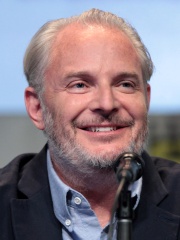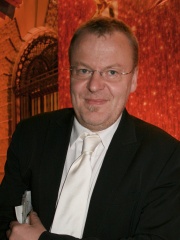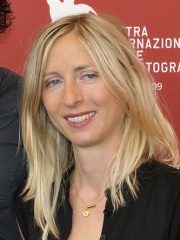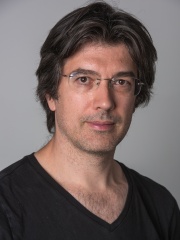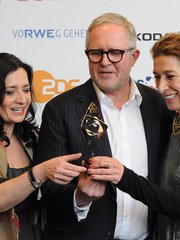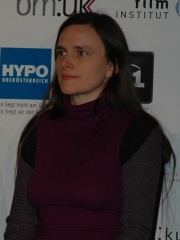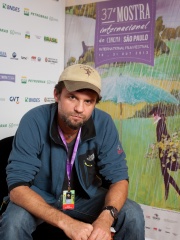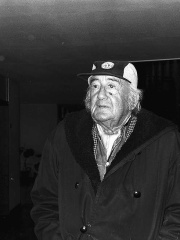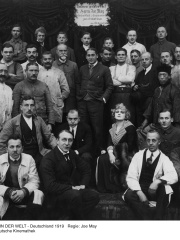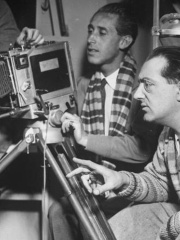
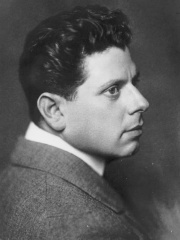
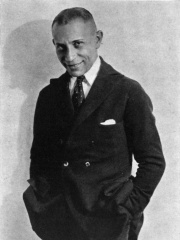
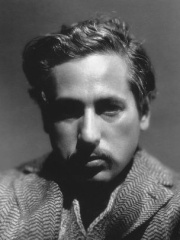
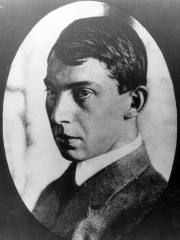

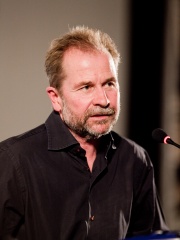
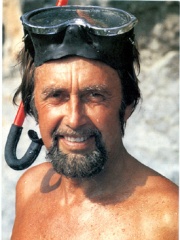
The Most Famous
FILM DIRECTORS from Austria
This page contains a list of the greatest Austrian Film Directors. The pantheon dataset contains 2,041 Film Directors, 24 of which were born in Austria. This makes Austria the birth place of the 19th most number of Film Directors behind Sweden, and Denmark.
Top 10
The following people are considered by Pantheon to be the top 10 most legendary Austrian Film Directors of all time. This list of famous Austrian Film Directors is sorted by HPI (Historical Popularity Index), a metric that aggregates information on a biography's online popularity. Visit the rankings page to view the entire list of Austrian Film Directors.

1. Fritz Lang (1890 - 1976)
With an HPI of 76.12, Fritz Lang is the most famous Austrian Film Director. His biography has been translated into 70 different languages on wikipedia.
Friedrich Christian Anton Lang (Austrian German: [ˈfriːdrɪç ˈkrɪsti̯a(ː)n ˈantɔn ˈlaŋ]; December 5, 1890 – August 2, 1976), better known as Fritz Lang (Austrian German: [ˈfrɪts ˈlaŋ]), was an Austrian-born film director, screenwriter, and producer who worked in Germany and later the United States. One of the best-known émigrés from Germany's school of Expressionism, he was dubbed the "Master of Darkness" by the British Film Institute. He has been cited as one of the most influential filmmakers of all time. Lang's work spans five decades, from the Expressionist silent films of his first German creative period to his short stay in Paris and his work as a Hollywood director to his last three films made in Germany. Lang's most celebrated films include the futuristic science-fiction film Metropolis (1927) and the influential M (1931), a film noir precursor. His 1929 film Woman in the Moon showcased the use of a multi-stage rocket, and also pioneered the concept of a rocket launch pad (a rocket standing upright against a tall building before launch having been slowly rolled into place) and the rocket-launch countdown clock. His other major films include Dr. Mabuse the Gambler (1922), Die Nibelungen (1924), and after moving to Hollywood in 1934, Fury (1936), You Only Live Once (1937), Hangmen Also Die! (1943), The Woman in the Window (1944), Scarlet Street (1945) and The Big Heat (1953). He became a naturalized citizen of the United States in 1939.

2. Max Reinhardt (1873 - 1943)
With an HPI of 69.52, Max Reinhardt is the 2nd most famous Austrian Film Director. His biography has been translated into 40 different languages.
Max Reinhardt (German: [maks ˈʁaɪnhaʁt] ; born Maximilian Goldmann; 9 September 1873 – 30 October 1943) was an Austrian-born theatre and film director, intendant, and theatrical producer. With his radically innovative and avant-garde stage productions, Reinhardt is regarded as one of the most prominent stage directors of the early 20th century. For example, Reinhardt's 1917 stage premiere of Reinhard Sorge's Kleist Prize-winning stage play Der Bettler almost single-handedly gave birth to Expressionism in the theatre and ultimately in motion pictures as well. In 1920, Reinhardt established the Salzburg Festival by directing an open air production of Hugo von Hofmannsthal's acclaimed adaptation of the Everyman Medieval mystery play in the square before the Cathedral with the Alps as a background. This remains an annual custom at the Salzburg Festival to this day. Toby Cole and Helen Krich Chinoy have dubbed Reinhardt, "one of the most picturesque actor-directors of modern times", and write that his eventual arrival in the United States as a refugee from the imminent Nazi takeover of Austria followed a long and distinguished career, "inspired by the example of social participation in the ancient Greek and Medieval theatres", of seeking, "to bridge the separation between actors and audiences". In 1935, Reinhardt directed his first and only motion picture in the United States through Warner Brothers, the Expressionist film adaptation of William Shakespeare's A Midsummer Night's Dream, starring James Cagney, Olivia De Havilland, and Mickey Rooney. The film was banned by the Ministry of Propaganda in an infamous example of censorship in Nazi Germany. This was due not only to Joseph Goebbels' belief that Expressionism was degenerate art, but even more so due to the Jewish ancestry of director Max Reinhardt, Classical music composer Felix Mendelssohn, and soundtrack arranger Erich Wolfgang Korngold, whose work was already banned by Goebbels as allegedly degenerate music. Reinhardt also founded the highly influential drama schools Hochschule für Schauspielkunst "Ernst Busch" in Berlin, Max Reinhardt Seminar, the Max Reinhardt Workshop (Sunset Boulevard), and the Max Reinhardt Junior Workshop. Even though Reinhardt did not live long enough to witness the end of Nazism in 1945, his formerly expropriated estate at Schloss Leopoldskron near Salzburg was restored to his widow and his legacy continues to be celebrated and honoured in the modern Germanosphere for his many radically innovative contributions to the performing arts.

3. Erich von Stroheim (1885 - 1957)
With an HPI of 68.78, Erich von Stroheim is the 3rd most famous Austrian Film Director. His biography has been translated into 50 different languages.
Erich Oswald Hans Carl Maria von Stroheim (born Erich Oswald Stroheim, Austrian German: [ˈʃtroːhaɪm]; September 22, 1885 – May 12, 1957) was an Austrian-American director, screenwriter, actor, and producer, most noted as a film star and avant-garde, visionary director of the silent era. His 1924 film Greed (an adaptation of Frank Norris's 1899 novel McTeague) is considered one of the finest and most important films ever made. After clashes with Hollywood studio bosses over budget and workers' rights problems, Stroheim found it difficult to find work as a director and subsequently became a well-respected character actor, particularly in French cinema. For his early innovations, Stroheim is still celebrated as one of the first of the auteur directors. He helped introduce more sophisticated plots and noirish sexual and psychological undercurrents into cinema. He died of prostate cancer in France in 1957, at the age of 71. Beloved by Parisian neo-Surrealists known as Lettrists, he was honored by Lettrist Maurice Lemaître with a 70-minute 1979 film titled Erich von Stroheim.

4. Josef von Sternberg (1894 - 1969)
With an HPI of 68.47, Josef von Sternberg is the 4th most famous Austrian Film Director. His biography has been translated into 41 different languages.
Josef von Sternberg (Austrian German: [ˈjoːzɛf fɔn ˈʃtɛrnbɛrg]; born Jonas Sternberg; May 29, 1894 – December 22, 1969) was an Austrian-American filmmaker whose career successfully spanned the transition from the silent to the sound era, during which he worked with most of the major Hollywood studios. He is best known for his film collaboration with actress Marlene Dietrich in the 1930s, including the highly regarded Paramount/UFA production The Blue Angel (1930). He was twice nominated for the Academy Award for Best Director, for Morocco (1930) and Shanghai Express (1932). Sternberg's finest works are noteworthy for their striking pictorial compositions, dense décor, chiaroscuro illumination, and relentless camera motion, endowing the scenes with emotional intensity. He is also credited with having initiated the gangster film genre with his silent era movie Underworld (1927). Sternberg's themes typically offer the spectacle of an individual's desperate struggle to maintain their personal integrity as they sacrifice themselves for lust or love. Shortly before his death in 1969, his autobiography, Fun in a Chinese Laundry, was published.
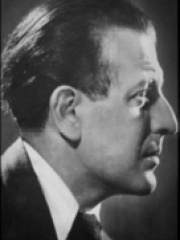
5. Gustav Ucicky (1899 - 1961)
With an HPI of 62.95, Gustav Ucicky is the 5th most famous Austrian Film Director. His biography has been translated into 21 different languages.
Gustav Ucicky (6 July 1899 – 27 April 1961) was an Austrian film director, screenwriter, and cinematographer. He was one of the more successful directors in Austria and Germany from the 1930s through to the early 1960s. His work covered a wide variety of genres, but he is most acclaimed for his work in romantic drama and drama films.

6. Alexander Korda (1893 - 1956)
With an HPI of 62.44, Alexander Korda is the 6th most famous Austrian Film Director. His biography has been translated into 35 different languages.
Sir Alexander Korda (; born Sándor László Kellner; Hungarian: Korda Sándor; 16 September 1893 – 23 January 1956) was a Hungarian–born British film director, producer, and screenwriter, who founded his own film production studios and film distribution company. Born in Hungary, where he began his career, he worked briefly in the Austrian and German film industries during the era of silent films, before being based in Hollywood from 1926 to 1930 for the first of his two brief periods there (the other was during World War II). The change led to a divorce from his first wife, the Hungarian film actress María Corda, who was unable to make the transition from silent films to "talkies" because of her Hungarian accent. From 1930, Korda was active in the British film industry, and soon became one of its leading figures. He was the founder of London Films and, post-war, the owner of British Lion Films, a film distribution company. Korda produced many outstanding classics of the British film industry, including The Private Life of Henry VIII, Rembrandt, Things To Come, The Thief of Baghdad and The Third Man. In 1942, Korda became the first filmmaker to receive a knighthood.

7. Ernst Marischka (1893 - 1963)
With an HPI of 62.41, Ernst Marischka is the 7th most famous Austrian Film Director. His biography has been translated into 21 different languages.
Ernst Marischka (2 January 1893 – 12 May 1963) was an Austrian screenwriter and film director. He wrote for more than 90 films between 1913 and 1962. He also directed 29 films between 1915 and 1962. He wrote and directed the Sissi trilogy - Sissi (1955), Sissi – The Young Empress (1956) and Sissi – Fateful Years of an Empress (1957). The films were based on the life of Empress Elisabeth of Austria. He was the brother of Hubert Marischka. He was named for the Academy Award for Best Original Screenplay in 1946, for A Song to Remember (1945).

8. Ulrich Seidl (b. 1952)
With an HPI of 59.40, Ulrich Seidl is the 8th most famous Austrian Film Director. His biography has been translated into 24 different languages.
Ulrich Maria Seidl (born 24 November 1952) is an Austrian film director, writer and producer. Among other awards, his film Dog Days won the Grand Jury Prize at Venice in 2001. His 2012 film Paradise: Love competed for the Palme d'Or at the 2012 Cannes Film Festival. The sequel Paradise: Faith won the Special Jury Prize at the 69th Venice International Film Festival. The final part of the trilogy, Paradise: Hope, premiered in competition at the 63rd Berlin International Film Festival.

9. Hans Hass (1919 - 2013)
With an HPI of 59.02, Hans Hass is the 9th most famous Austrian Film Director. His biography has been translated into 24 different languages.
Hans Hass (23 January 1919 – 16 June 2013) was an Austrian biologist and underwater diving pioneer. He was known mainly for being among the first scientists to popularise coral reefs, stingrays, octopuses and sharks. He pioneered the making of documentaries filmed underwater and led the development of a type of rebreather. He is also known for his energon theory and his commitment to protecting the environment.
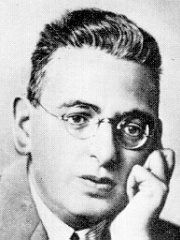
10. Richard Oswald (1880 - 1963)
With an HPI of 58.23, Richard Oswald is the 10th most famous Austrian Film Director. His biography has been translated into 22 different languages.
Richard Oswald (5 November 1880 – 11 September 1963) was an Austrian film director, producer, screenwriter, and father of German-American film director Gerd Oswald.
People
Pantheon has 24 people classified as Austrian film directors born between 1873 and 1977. Of these 24, 9 (37.50%) of them are still alive today. The most famous living Austrian film directors include Ulrich Seidl, Francis Lawrence, and Stefan Ruzowitzky. The most famous deceased Austrian film directors include Fritz Lang, Max Reinhardt, and Erich von Stroheim. As of April 2024, 2 new Austrian film directors have been added to Pantheon including Götz Spielmann, and Sabine Derflinger.
Living Austrian Film Directors
Go to all RankingsUlrich Seidl
1952 - Present
HPI: 59.40
Francis Lawrence
1971 - Present
HPI: 56.52
Stefan Ruzowitzky
1961 - Present
HPI: 54.41
Jessica Hausner
1972 - Present
HPI: 48.70
Virgil Widrich
1967 - Present
HPI: 46.95
Götz Spielmann
1961 - Present
HPI: 44.91
Sabine Derflinger
1963 - Present
HPI: 43.66
Barbara Albert
1970 - Present
HPI: 43.02
Hans Weingartner
1977 - Present
HPI: 41.26
Deceased Austrian Film Directors
Go to all RankingsFritz Lang
1890 - 1976
HPI: 76.12
Max Reinhardt
1873 - 1943
HPI: 69.52
Erich von Stroheim
1885 - 1957
HPI: 68.78
Josef von Sternberg
1894 - 1969
HPI: 68.47
Gustav Ucicky
1899 - 1961
HPI: 62.95
Alexander Korda
1893 - 1956
HPI: 62.44
Ernst Marischka
1893 - 1963
HPI: 62.41
Hans Hass
1919 - 2013
HPI: 59.02
Richard Oswald
1880 - 1963
HPI: 58.23
Harald Reinl
1908 - 1986
HPI: 57.71
Joe May
1880 - 1954
HPI: 56.56
Leopold Lindtberg
1902 - 1984
HPI: 55.88
Newly Added Austrian Film Directors (2025)
Go to all RankingsOverlapping Lives
Which Film Directors were alive at the same time? This visualization shows the lifespans of the 15 most globally memorable Film Directors since 1700.

